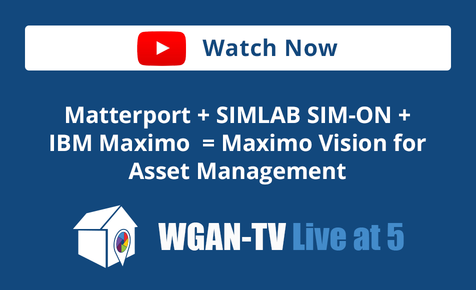Video: DSLR Real Estate Camera Angles Tips and Tricks15248
Pages:
1
 WGAN Forum WGAN ForumFounder & WGAN-TV Podcast Host Atlanta, Georgia |
DanSmigrod private msg quote post Address this user | |
| Tips of the Week --- Video: Real Estate Camera Angles Tips and Tricks | Video courtesy of iGUIDE YouTube Channel | 16 July 2021 Hi All, Transcript below ... Is this video, Planitar Inc. (iGUIDE) Marketing Manager Chris white gives real estate camera angles tips and tricks. What tips and tricks do you recommend? Best, Dan Video: iGUIDE Viewer | Video courtesy of iGUIDE YouTube Channel | 21 February 2021 iGUIDE PLANIX Sample 3D Tour and with Interactive Floor Plan courtesy of iGUIDE | 2D Schematic Floor Plans https://youriguide.com/pla_1_608_jones_st_e_st_marys_on/doc/floorplan_imperial_en.pdf Transcript (video above) Chris White (00:00): All right. So when you're choosing angles, I'm going to give you some hot tips, always shoot for safety. You can do whatever you want, obviously when you're like a hot dog and you want to show off, but always shoot from corner to corner for the most part. And what that does is it allows you to sort of frame the entire room without cutting off any weird furniture. I mean, you might have to cut some things occasionally, but it allows you to show the space. And what it also does is it allows you to use leading lines. So leading lines is a fancy way of saying lines that pull, not focus exactly, but the intended thing that's important in the image, to pull you into it, to draw you in. Chris White (00:49): So if you shoot from corner to corner, you're always going to have these lines that move into the center of the frame at the intersection between walls and ceilings, right? Often what that means is that in order to take that picture, you've also backed up into the opposite corner, giving you the maximum field of view that you can get with your lens. And if you do that, you're going to capture most of the room in like one image. You don't have to shoot a bunch of little small ones. You can save a lot of time by just shooting the one. Chris White (01:19): The goal with shooting any image, I vaguely mentioned this earlier, is to tell a story. So that story is often, what's it like to be in this space? So the story is, it's very nice to sit in this living room. And my advice in terms of angles is to think critically about what it is you're trying to communicate to people every time you take an image. Don't just walk into a space and, oh, living room, click-click, and then move on. Right? Think about where people are going to sit, what they're going to look at, what they want to know when they are sitting in that space. Not what's beautiful. Although, you can do that too. It's about creating a sense that someone is in the property, telling that story of what it would be like to live in that house. Chris White (02:07): We always get really focused on things that are pretty and that we want to impress people with, but that's not really the point of these photos. The whole point of these photos in real estate is to sell the property by giving people an idea of what it would be like to live there so they can say, I want to live in that house. I would like to pay you money for that house, please. If you stick to that, it'll make your photos make sense. And that's my honest advice to you is try to make every photo make sense. Chris White (02:33): So I'll give you an example. You might be standing in a combo kitchen, living and dining room, and you might do a photo that's like half a dining room and a kitchen and a part of a living. But what is that for? That doesn't really focus on each space. Are you doing that photo to show the connection between the spaces? Is that what you're trying to communicate? It's perfectly fine to do that photo if you think it's important, but you want to be thinking about that in terms of what you're trying to show people. So I'll give you an example. Chris White (03:03): I'm going to do a photo of the dining room. I don't want to show the other rooms, even though they're all connected in one big space. I want to really focus on this dining room to give people an idea what it would be like to eat here. So, that's what I do. I frame it up. I just show the dining room. And then I go to the living room and I do the same thing. And then I go to the kitchen and I do the same thing. And then I think to myself, this space is big, it's open concept. I want one photo to show the relationship between these spaces, what is the best place to stand to get that photo? And I would just kind of think of something that makes sense. And it might not be one. Chris White (03:34): A really good example of a photo that doesn't focus on one space that shows the connection between spaces would be like a master bedroom, one of those little weird hallways that's like a vanity thing where they have seats and then a master bathroom connected to it, because people want to know that. They want to know, what's it like to walk from my awesome new master bed bedroom into this bathroom and do my hair or whatever. I mean, that makes sense. That photo is a good one. Looking the opposite way out from the bathroom into the bedroom is kind of weird. Again, this is opinion. I don't think that's a valuable photo because I don't think I'm curious in the same way. What I want to think is does this master bedroom have an awesome bathroom, not does my master bathroom have an awesome bedroom. That seems reversed to me. Chris White (04:21): Anyway. Choosing what angles make sense is all about sort of trying to show the space in a way that makes sense for the viewer using those leading lines that I mentioned and being critical about the photos that you're taking. |
||
| Post 1 • IP flag post | ||
 WGAN Forum WGAN ForumFounder & WGAN-TV Podcast Host Atlanta, Georgia |
DanSmigrod private msg quote post Address this user | |
| Video: Why Wide Angle Lens Matter | Video courtesy of iGUIDE YouTube Channel | 19 July 2021 | ||
| Post 2 • IP flag post | ||
Pages:
1This topic is archived. Start new topic?
















